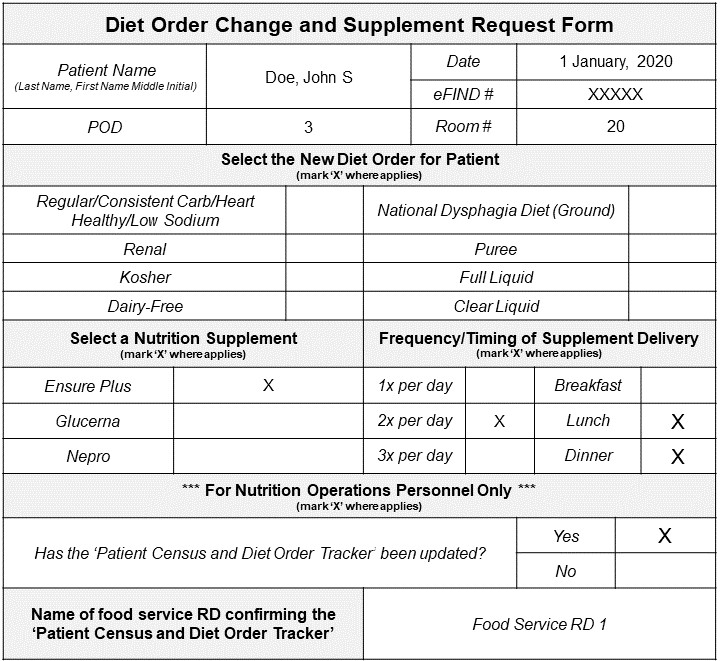Registered Dietitians frequently work hand-in-hand with primary care providers as part of a multidisciplinary healthcare team to deliver coordinated care. RDs are an integral part of a patient’s health care, as they are trained to assess the nutrition-related health needs of patients, considering other factors affecting nutrition and health status (e.g., culture, ethnicity, and social determinants of health), provide nutrition counseling and nutrition education to optimize nutritional status, prevent disease, or maintain and/or improve health and well-being [1]. Research has shown consulting a RD in primary care settings appear effective for improving diet quality, diabetes outcomes, and weight loss outcomes [2]. However, additional studies have found low referral rates from primary care clinicians to a RD amongst the most vulnerable patients such as those at risk of malnutrition [3].
References
- The Academy Quality Management Committee Academy of Nutrition and Dietetics: Revised 2017 Scope of Practice for the Registered Dietitian Nutritionist. Journal of the Academy of Nutrition and Dietetics 2017, 118, 141–165, doi:10.1016/j.jand.2017.10.002.
- Mitchell, L.J.; Ball, L.E.; Ross, L.J.; Barnes, K.A.; Williams, L.T. Effectiveness of Dietetic Consultations in Primary Health Care: A Systematic Review of Randomized Controlled Trials. J Acad Nutr Diet 2017, 117, 1941–1962, doi:10.1016/j.jand.2017.06.364.
- Eglseer, D.; Bauer, S. Predictors of Dietitian Referrals in Hospitals. Nutrients 2020, 12, doi:10.3390/nu12092863.
Purpose: The Nutrition Consultation Form is designed to streamline requests from the patient’s primary care manager or nursing team for nutrition consultation by a clinical RD. This consultation is designed to be conducted with limited contact time (<5 minutes), performed at a distance (to accommodate medical personnel safety), and integrate assessments, recommendations, and educational needs within the same form.
Utilization: Prior to use, update the ‘eFIND#’ to the field hospital’s medical record numbering system. The patient’s primary care manager or nursing team should complete the Nutrition Consultation Form when requesting nutrition assessment or education from a clinical RD.
Download: A PDF fillable version of the Nutrition Consultation Form can be found here!
Example of Nutrition Consultation Form used at the Javits New York Medical Station from 28 April through 01 May of 2020:
Purpose: The Diet Order Change and Supplement Request Form is designed to streamline changes in diet orders and/or oral nutrition supplements requested by the patient’s primary care manager. This is of particular importance if a field hospital lacks an EMR for recording patient nutrition and medical status. Furthermore, such a form can ensure that therapeutic meals reconcile with medical prognoses and treatments.
Utilization: Prior to use, update the ‘eFIND#’ to the field hospital’s medical record numbering system. The patient’s primary care manager should complete the Diet Order Change and Supplement Request Form following a new diet order and/or prescription for an oral nutrition supplement. If an oral nutrition supplement is selected, the frequency and timing of supplement delivery must also be selected. This form is then submitted to Nutrition Operations personnel or the designated personnel’s mailbox. Food service dietitians then update the Patient Census and Diet Order Tracker with the changes.
Download: A PDF fillable version of the Diet Order Change and Supplement Request Form can be found here!
Example of Diet Order Change and Supplement Request Form used at the Javits New York Medical Station from 28 April through 01 May of 2020:
Purpose: The Food Temperature Log is designed to monitor and record food temperatures to ensure food is safe when stored, prepared, and served. This is of particular importance when meal preparation occurs at an off-site facility and must be transported to the field hospital for before each meal delivery.
Utilization: One log is needed per day of patient meal delivery. Nutrition staff and personnel should perform temperature checks on a predetermined sample proportion of meals and/or food items per meal period. If there is a discrepancy between the temperature taken and the appropriate temperature to maintain food safety, the food service dietitian is alerted and implements a corrective action.
- Appropriate cold chain management: ≤41°F (5°C)
- Appropriate hot chain management: >135°F (57°C)
Download: A PDF fillable version of the Food Temperature Log Form can be found here!
Example of Food Temperature Log used at the Javits New York Medical Station from 28 April through 01 May of 2020:



